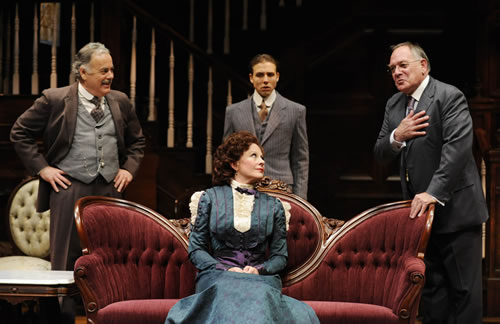
Pictured standing (left to right) John Shepard, Chris Landis, and Ross Bickell. Seated is Helena Ruoti. Photo credit: Pittsburgh Public Theater.
In 1982 I was Lillian Hellman for fifteen minutes.
For 10th grade English class, we were each asked to choose an author and to research and report on that author. We were encouraged to dress like the author, bring visual aids, and generally get into the assignment.
I had read Pentimento that summer, so it took me no more than a moment to choose Lillian Hellman as my author. I already wanted to live her life. She’d written plays and movies, had a love affair with Dashiell Hammett, stood up to the House Un-American Activities Committee.
But to hurt innocent people whom I knew many years ago in order to save myself is, to me, inhuman and indecent and dishonorable. I cannot and will not cut my conscience to fit this year’s fashions, even though I long ago came to the conclusion that I was not a political person and could have no comfortable place in any political group. [source]
She wasn’t a beautiful woman, yet she was uncompromising and unstoppable, and I wanted to grow up to be her.
In preparing my report I couldn’t find copies of her plays — the school library and Butler Public Library offered limited resources. But I read An Unfinished Woman, her first memoir, and a biography of Hammett that talked about her. I re-read Pentimento, and tried to internalize Hellman’s poetic prose. Here’s the opening of Pentimento:
Old paint on a canvas, as it ages, sometimes becomes transparent. When that happens it is possible, in some pictures, to see the original lines: a tree will show through a woman’s dress, a child makes way for a dog, a large boat is no longer on an open sea. That is called pentimento because the painter “repented,” changed his mind. Perhaps it would be as well to say that the old conception, replaced by a later choice, is a way of seeing and then seeing again. That is all I mean about the people in this book. The paint has aged and I wanted to see what was there for me once, what is there for me now.
I wanted so much to do justice to my subject, I stayed up all night reading and re-reading the night before the report — my first all-nighter. The class was in the afternoon; to stay awake I got a couple of tablets NoDoze from another girl in the dorm. For a prop I borrowed a cigarette from another girl in the class. I was tired, wired, and full of plans and ideals and beautiful language.
At the time I had never heard of Method acting, but I suspect this might have been the first use of the technique in presenting a report in 10th grade English class.
I tottered around the front of the classroom in low-heeled pumps, and a belted beige suit, waving my (unlit) cigarette around and talking. I had no outline, just a page of phrases and quotes that I peered at now and then. Mostly I ranted in a vague attempt at a Southern accent. I told the class about my life with Dash, about my plays and films, about my childhood, and about how to write.
Eventually the fifteen minutes allotted for my report ended. I didn’t have a final statement, so I said “thanks” and sat down. Afterward my friends who smoked told me that I did the smoking part all wrong; I never exhaled. Despite my cigarette misuse I got an A.
Since that time, I’ve learned a lot more about Lillian Hellman. It’s likely that she fabricated the story “Julia” in Pentimento, created it from the private memoirs of another woman. She probably made up or at least embellished much of what she wrote about herself. Dashiell Hammett may have played a bigger role in the writing of her great plays — the memorable characters, the quotable dialogue — than she or he would admit.
It’s strange to look back on my childhood hero and see her in a new light, one that’s not wholly flattering. I think now that she was who she was, struggling through her life as we all do, making what sense of it we can. I still want to be like her, at least a little.
Actually, I would settle for writing one thing as unforgettable as The Little Foxes. The Pittsburgh Public Theatre is running Hellman’s most famous play until December 13.
I saw the show on Press Night (disclaimer: The Public provided me with complimentary tickets.) and thought the three-act play snapped along well. As always, the production is top-notch: stunning set (with a beautiful and very important staircase), lush costumes, perfect lighting, juicy and biting performances. Helena Ruoti plays an elegant, cold, scheming Regina, and I enjoyed Ross Bickell’s take on Ben Hubbard. I fear that Michael McKenzie seemed a little too healthy for Horace Giddens, verging on athletic, but otherwise he was convincing as a dying man trying to do right in a poisoned world. Deidre Madigan is heartbreaking as Birdie Hubbard, fragile and fearful, living on memories.
The play carries an emotional wallop. During the critical third act, I heard people in the theater gasping at all the right points.
Being a tale of a quintessential dysfunctional family, The Little Foxes is either a strange play to see during the holiday season or a perfect one. I recommend it.
[Get more information about The Little Foxes at the Public’s website.]

As the publicist for Pittsburgh Public Theater I’m happy that you helped us get the word out about the play. As a reader, however, I LOVED your post. Such a great story. So much packed into a relatively short space. So personal. To me, this is blogging at its best.